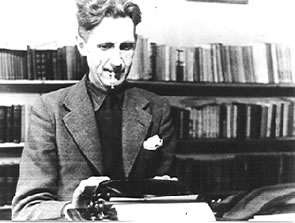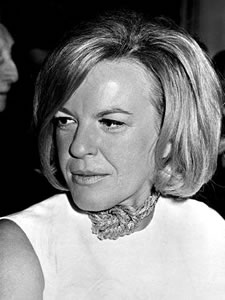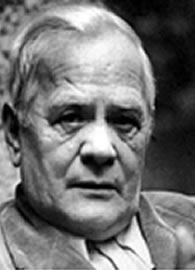De Britse schrijver George Orwell (pseudoniem van Eric Arthur Blair) werd op 25 juni 1903 geboren in Motihari, India. Zie ook mijn blog van 25 juni 2006.
Uit: Animal Farm
“MR. JONES, of the Manor Farm, had locked the hen-houses for the night, but was too drunk to remember to shut the popholes. With the ring of light from his lantern dancing from side to side, he lurched across the yard, kicked off his boots at the back door, drew himself a last glass of beer from the barrel in the scullery, and made his way up to bed, where Mrs. Jones was already snoring.
As soon as the light in the bedroom went out there was a stirring and a fluttering all through the farm buildings. Word had gone round during the day that old Major, the prize Middle White boar, had had a strange dream on the previous night and wished to communicate it to the other animals. It had been agreed that they should all meet in the big barn as soon as Mr. Jones was safely out of the way. Old Major (so he was always called, though the name under which he had been exhibited was Willingdon Beauty) was so highly regarded on the farm that everyone was quite ready to lose an hour’s sleep in order to hear what he had to say.
At one end of the big barn, on a sort of raised platform, Major was already ensconced on his bed of straw, under a lantern which hung from a beam. He was twelve years old and had lately grown rather stout, but he was still a majestic-looking pig, with a wise and benevolent appearance in spite of the fact that his tushes had never been cut. Before long the other animals began to arrive and make themselves comfortable after their different fashions. First came the three dogs, Bluebell, Jessie, and Pincher, and then the pigs, who settled down in the straw immediately in front of the platform. The hens perched themselves on the window-sills, the pigeons fluttered up to the rafters, the sheep and cows lay down behind the pigs and began to chew the cud. The two cart-horses, Boxer and Clover, came in together, walking very slowly and setting down their vast hairy hoofs with great care lest there should be some small animal concealed in the straw.”

George Orwell (25 juni 1903 – 21 januari 1950)
De Russische dichter en vertaler Arseny Alexandrovich Tarkovsky werd geboren op 25 juni 1907 in Elisavetgrad. Van 1925 tot 1929 studeerde hij creatief schrijven. In die tijd vertaalde hij veel poézie uit het Turkmeens, Georgisch, Armeens en Arabisch. Tijdens WO II werkte hij voor de legerkrant Boevaya Trevoga. Tarkovsky heeft zijn hele leven gedichten geschreven, maar met publiceren begon hij pas toen hij de vijftig gepasseerd was.
Steppe
Earth swallows herself
And, knocking her head against the sky,
Patches the gaps in her memory
With humankind and grass.
Grass hides under the horse-shoes,
Soul in an ivory box;
Only word beneath the moon
Looms in the steppe
Which sleeps like a corpse.
Boulders on burial mounds –
Tsars playing at watchmen –
Drunk stupid on moonlight.
Word is the last to die.
When the drill of water pushes up
Through the subsoil’s tough integument,
Sky will stir
And burdock’s eyelash sigh,
Grasshopper’s saddle flash,
Bird of the steppe comb,
Sleepy, its rainbow wing.
Then up to his shoulders in blue-grey milk
See Adam enter the steppe from paradise,
Restoring both to bird and stone
The gift of intelligent speech;
He recreated while they slept
Their palpitating names,
And now he breathes delirium of consciousness,
Loving, like soul, into grass.
I dreamed this dream and I still dream of it
I dreamed this dream and I still dream of it
and I will dream of it sometime again.
Everything repeats itself and everything will be reincarnated,
and my dreams will be your dreams.
There, to one side of us, to one side of the world
wave after wave breaks on the shore:
there’s a star on the wave, and a man, and a bird,
reality and dreams and death – wave after wave.
Dates are irrelevant. I was, I am, I will be.
Life is a miracle of miracles, and I kneel
before the miracle alone like an orphan,
alone in the mirrors, enclosed in reflections,
seas and towns, shining brightly through the smoke.
A mother cries and takes her baby on her knee.
Vertaald door Richard McKane

Arseny Tarkovsky (25 juni 1907 – 27 mei 1989)
De Oostenrijkse dichteres Ingeborg Bachmann werd geboren op 25 juni 1926 in Klagenfurt. Zie ook mijn blog van 25 juni 2006.
Schatten Rosen Schatten
Unter einem fremden Himmel
Schatten Rosen Schatten
auf einer fremden Erde
zwischen Rosen und Schatten
in einem fremden Wasser
mein Schatten
Duikles zu sagen
Wie Orpheus spiel ich
auf den Saiten des Lebens den Tod
und in die Schönheit der Erde
und deiner Augen, die den Himmel verwalten,
weiß ich nur Dunkles zu sagen.
Vergiß nicht, daß auch du, plötzlich,
an jenem Morgen, als dein Lager
noch naß war von Tau und die Nelke
an deinem Herzen schlief,
den dunklen Fluß sahst,
der an dir vorbeizog.
Die Saite des Schweigens
gespannt auf die Welle von Blut,
griff ich dein tönendes Herz.
Verwandelt ward deine Locke
ins Schattenhaar der Nacht,
der Finsternis schwarze Flocken
beschneiten dein Antlitz.
Und ich gehör dir nicht zu.
Beide klagen wir nun.
Aber wie Orpheus weiß ich
auf der Seite des Todes das Leben,
und mir blaut
dein für immer geschlossenes Aug.
Was wahr ist
Was wahr ist, streut nicht Sand in deine Augen,
was wahr ist, bitten Schlaf und Tod dir ab
als eingefleischt, von jedem Schmerz beraten,
was wahr ist, rückt den Stein von deinem Grab.
Was wahr ist, so entsunken, so verwaschen
in Keim und Blatt, im faulen Zungenbett
ein Jahr und noch ein Jahr und alle Jahre –
was wahr ist, schafft nicht Zeit, es macht sie wett.
Was wahr ist, zieht der Erde einen Scheitel,
kämmt Traum und Kranz und die Bestellung aus,
es schwillt sein Kamm und voll gerauften Früchten
schlägt es in dich und trinkt dich gänzlich aus.
Was wahr ist, unterbleibt nicht bis zum Raubzug,
bei dem es dir vielleicht ums Ganze geht.
Du bist sein Raub beim Aufbruch deiner Wunden;
nichts überfällt dich, was dich nicht verrät.
Es kommt der Mond mit den vergällten Krügen.
So trinkt dein Maß. Es sinkt die bittre Nacht.
Der Abschaum flockt den Tauben ins Gefieder,
wird nicht ein Zweig in Sicherheit gebracht.
Du haftest in der Welt, beschwert von Ketten,
doch treibt, was wahr ist, Sprünge in die Wand.
Du wachst und siehst im Dunkeln nach dem Rechten,
dem unbekannten Ausgang zugewandt.

Ingeborg Bachmann (25 juni 1926 – 17 oktober 1973)
De Duitse dichter en schrijver Hans Marchwitza werd geboren in Scharley op 25 juni 1890. Marchwitza was de zoon van een mijnwerkersgezin uit het Ruhrgebied, en ging zelf ook aan het werk als mijnwerker. Door deelname aan een staking werd hij werkloos, en vocht daarna als soldaat in de WO I. In de jaren die daarop volgden, ontwikkelde hij een communistische gezindheid. In de jaren twintig begon hij, opnieuw werkloos, te schrijven voor de kranten Rote Fahne en Rote Front. In 1930 kwam zijn eerste boek uit: Sturm auf Essen, over de sociale strijd in het Ruhrgebied in de jaren twintig. Na de machtsovername door Hitler in 1933 vluchtte hij naar Zwitserland, verbleef in het onder Frans beheer vallende Saarland en hij nam deel aan de Spaanse Burgeroorlog. Terug in Duitsland werd hij meteen gearresteerd. In 1941 slaagde hij erin te vluchten naar de VS. In New York vond hij werk als bouwvakker. Na de oorlog vestigde hij zich in de Duitse Oostzone (vanaf 1949 DDR), en richtte daar de Akademie der Künste op. Hij schreef een aantal socialistisch-realistische romans. Voor zijn literaire werk werd hij in de DDR overladen met prijzen, zoals de Nationalpreis der DDR (1950, 1955 en 1964) de Karl-Marx-orde en het erehoogleraarschap van de Humboldt Universiteit van Berlijn.
Uit: Sturm auf Essen
“Es ist das Jahr 1918 und Winter.
Schnee fällt.
Die Männer, die den Krieg überlebt haben, kommen heim. Die Zechenhäuser, in die sie zurückkehren, sind grau und schief, und ihr Verputz sieht aus wie das abgeschundene Fell alter Grubengäule. Die „Grabentiere” sollen wieder Väter, Ehemänner, Brüder, Söhne werden. Die Frauen schreien, Mütter schreien, Schwestern heulen : „Er ist wieder da, o mein Gott!” 0 mein Gott! Die Kinder fragen den fremden Mann, der ihr Vater ist: „Bringst du Brot mit?”
Das Wort „Brot” wirkt wie der Duft von Blumen in einem Märchen. „Heiliges Brot”, stammeln die vor Hunger zitternden alten Leute, während sie das ihnen hingehaltene Stück mit aller Scheu hinnehmen. „Die Totgeglaubten dachten an uns.”
Einem verhassten, verfluchten Krieg folgte ein verhasster, verfluchter Nachkrieg.
Dunkel sind die Küchen, die Kammern; die Höfe dunkel und die Straßen dunkel. Der Krieg hat Menschen gefressen, er hat Kohle gefressen mit seinem Riesenmaul, er fraß Liebe, Ehen, er fraß die Läden leer; die Zähne des Krieges zerbissen und zerrissen die Wände der Zechenhäuser. Der Krieg nagte die mühsam erkämpften Gardinen von den Fenstern, die Bezüge von den Betten
und die Füße nackt. Er bedeckte die Familien mit Geschwür und Krätze und setzte Rachitis und Hunger als nie mehr weichende Schreckensgäste in die verkommenden Wohnungen der Bergarbeiter.
„ Du, das mitgebrachte Hemd will ich einem der Buben umnähen, sie haben fast nichts mehr am Leibe!”

Hans Marchwitza (25 juni 1890 – 17 januari 1965)
De Canadese schrijver Yann Martel werd op 25 juni 1963 geboren in Salamanca en woonde in onder andere Alaska, Costa Rica, Frankrijk en Mexico doordat zijn vader werkte als leraar en diplomaat. Het reizen zit in zijn bloed, en later woondehij onder andere in Iran, Turkije en India. Hij studeerde filosofie aan de Trent University in Peterborough, Ontario, en begon aan zijn schrijfcarrière toen hij 26 was. Voor zijn boek Leven van Pi die de Booker Prize won spendeerde hij zes maanden in India waar hij bezoeken bracht aan moskeeën, tempels, kerken en dierentuinen. Daarna nam hij een jaar voor het lezen van religieuze teksten en schipbreukeling-verhalen, en deed twee jaar over het schrijven van het boek. Momenteel woont hij in Montréal.
Uit: Life of Pi
“I was a very good student, if I may say so myself. I was tops at St. Michael’s College four years in a row. I got every possible student award from the Department of Zoology. If I got none from the Department of Religious Studies, it is simply because there are no student awards in this department (the rewards of religious study are not in mortal hands, we all know that). I would have received the Governor General’s Academic Medal, the University of Toronto’s highest undergraduate award, of which no small number of illustrious Canadians have been recipients, were it not for a beef-eating pink boy with a neck like a tree trunk and a temperament of unbearable good cheer.
I still smart a little at the slight. When you’ve suffered a great deal in life, each additional pain is both unbearable and trifling. My life is like a memento mori painting from European art: there is always a grinning skull at my side to remind me of the folly of human ambition. I mock this skull. I look at it and I say, “You’ve got the wrong fellow. You may not believe in life, but I don’t believe in death. Move on!” The skull snickers and moves ever closer, but that doesn’t surprise me. The reason death sticks so closely to life isn’t biological necessity — it’s envy. Life is so beautiful that death has fallen in love with it, a jealous, possessive love that grabs at what it can. But life leaps over oblivion lightly, losing only a thing or two of no importance, and gloom is but the passing shadow of a cloud. The pink boy also got the nod from the Rhodes Scholarship committee. I love him and I hope his time at Oxford was a rich experience. If Lakshmi, goddess of wealth, one day favours me bountifully, Oxford is fifth on the list of cities I would like to visit before I pass on, after Mecca, Varanasi, Jerusalem and Paris.”

Yann Martel (Salamanca, 25 juni 1963)
